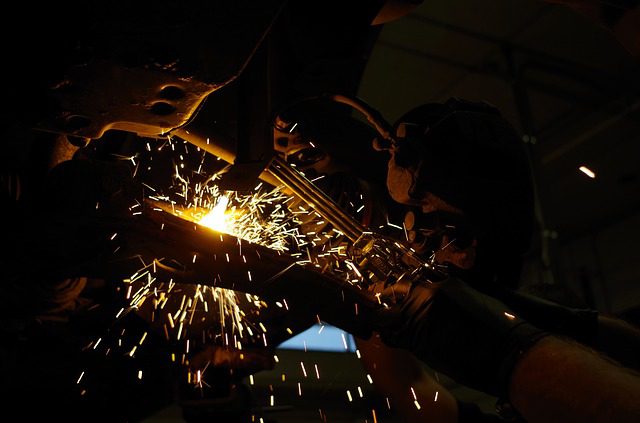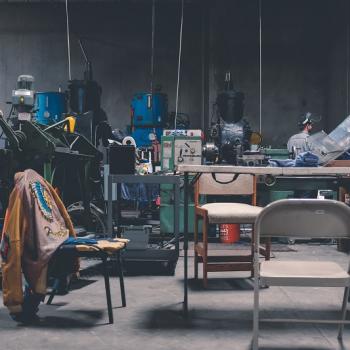Here’s another post in an occasional series about blue-collar work and meaning that we’re running here on MISSION:WORK. Read the other posts here: “Does blue-collar work have any meaning?” , “Which is a higher calling: building churches or building fences?”, “The craftsman and her environment,” “The faith and work conversation we’re NOT having,” “Voices from the fields: baking bread” and “Voices from the fields: shoveling hog poop.”
By Jordan Dillon
When I was a kid I grew up hearing I’d be a leader. When I heard the stories of Moses and Abraham I listened through the perspective of the leaders. I thought about the burden of that much responsibility, but also about the internal fortitude required to carry that mantel. This was always part of my consciousness and I didn’t know exactly how it would unfold.
I went to college a few years late and didn’t know what I wanted to do with my life. That was ok with me, but I still had this underlying sense that I was supposed to do something big and important. I was supposed to lead something. Before college, I haphazardly got a job at a local company that manufactured different valves for the drilling, agriculture, automobile, and food industries. It wasn’t something I wanted to give my life to, but it was a job.
In my sophomore year I changed my major from journalism to Bible and Religion. I vaguely planned on going into vocational ministry. I didn’t love journalism and I loved my bible classes. I figured to spend so much on a private education, I should at least enjoy it. I did.
I graduated and dabbled in some different ministry internships and part time work. None of it fit. None of it lasted. None of it worked.
I was also not interested in taking out more school loans to get into academics, especially with the expected payscale in that field. All along, the machine shop remained. For different reasons at different times, so did I. One of the great ironies was that working as a manual and an automated machinist in the shop, for about 6 months, was one of my primary motivations for going to school: I didn’t want to spend my life in the shop with no options. Now, 14 years later, I’m still there.
At my machine I have about 9 hours a day to think through life. Sometimes this is a blessing and sometimes a curse. But I’ve changed my perspective over the years and here’s what I’ve learned.
- The first hurdle for me to get over was the haunting sense that I wasn’t fulfilling a mission in the kingdom if I wasn’t’ in vocational ministry. I came to see that this was a false idea and expectation that I had placed on myself somewhere along the line. I quit believing that, and embraced the mission of God wherever I am, with my neighbors, coworkers, and in my context. I realized my presence and sensitivity to my context brings God there and continues His mission. I don’t have to go somewhere for ministry.
- Part of the reason I went to college was “so I don’t end up stuck here in 20 years.” Or so I said. The part I got stuck on in that sentence was the ‘20 years’ part. I’ve some to realize that years are not what my concern was, it was another word in that sentence:‘stuck.’ I am still at the shop, yes, but I am NOT stuck. I can leave whenever I want, and I can do anything I choose. For me, getting my degree and maturing in life helped me feel unstuck. I’ve become much more content since this realization that I am no longer stuck. I choose to be here.
- I realized that part of where I find fulfillment and value and satisfaction is working with my hands. I like making stuff. I like working on my 100-year-old house, renovating it, reimagining it with my wife and making it happen by the sweat of my brow. This is how God has wired me. I know that now and lean into that.
- Lastly, I learned I am blue-collar. I am common. I am normal. I am average. None of these descriptions mean I am less valuable or don’t have work to do in the economy of God. But they are descriptions of myself that are accurate and objectively true. I spent years trying to distance myself from this reality. I looked down on middle-class, blue-collar work in some way and therefore looked down on myself as well.
There was a dissonance for me for a while. I thought I was going to be the leader. I thought I was supposed to be more of a Moses-type. As I reexamined that narrative more closely I realized that there was only one Moses…and there were tens of thousands of Israelites. Tens of thousands of blue-collar people. Common people. Normal people. Average people. All of whom had important jobs to do, and some even with leadership qualities and lower level responsibilities. I read those stories from a different perspective now, through the eyes of the peasants. I realized it was pretty likely that I was an Israelite and not Moses.
At least that’s the perspective I’ll live through until I happen upon a burning bush.
 Jordan Dillon is the lead machinist at Strataflo Products Inc, in Fort Wayne Indiana, where he lives with his wife and 3 children. Strataflo produces high quality check valves and Jordan has been with them for 14 years. Jordan also graduated in 2008 from Huntington University with a BA in Bible and Religion. Jordan has experience in both manufacturing and historic house restoration among other Midwestern life experiences and enjoys writing about all aspects of life as they interface with God’s Kingdom.
Jordan Dillon is the lead machinist at Strataflo Products Inc, in Fort Wayne Indiana, where he lives with his wife and 3 children. Strataflo produces high quality check valves and Jordan has been with them for 14 years. Jordan also graduated in 2008 from Huntington University with a BA in Bible and Religion. Jordan has experience in both manufacturing and historic house restoration among other Midwestern life experiences and enjoys writing about all aspects of life as they interface with God’s Kingdom.

















